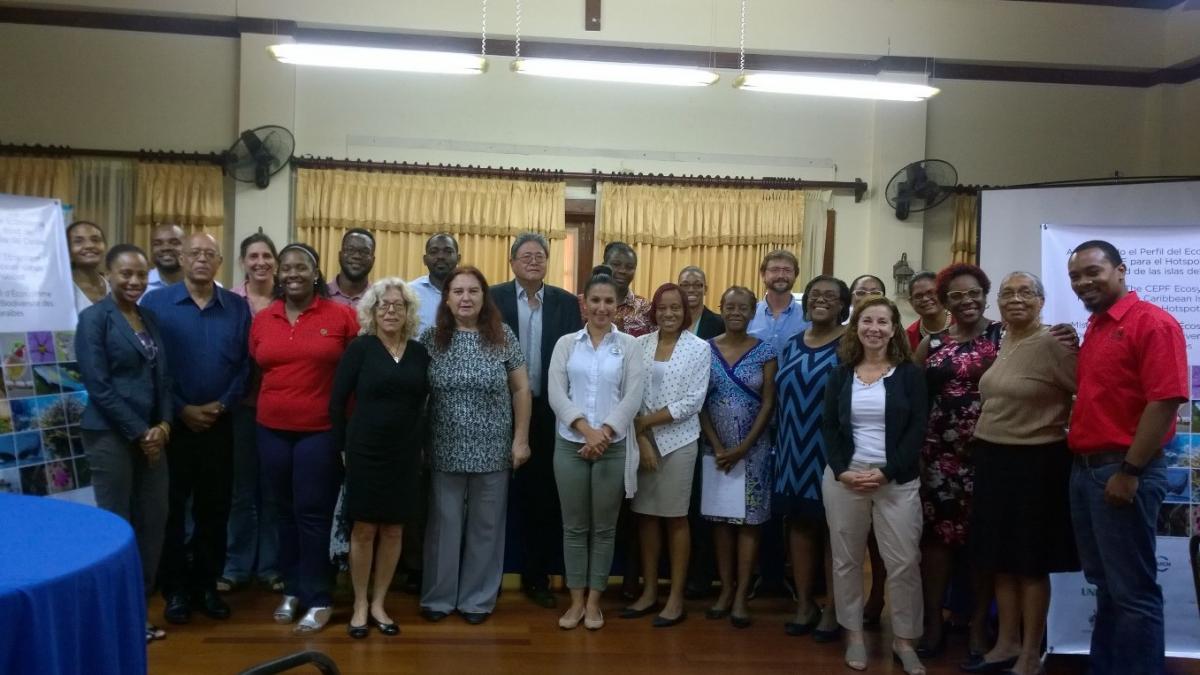Updating the CEPF Ecosystem Profile for the Caribbean Islands Biodiversity Hotspot: Emerging issues and priorities
Port of Spain, 2017 – What keeps conservation stakeholders across the Caribbean Islands biodiversity hotspot awake at night? Our experience leading the consultation process on the priorities for the Critical Ecosystem Partnership Fund (CEPF) ecosystem profile for the Caribbean Islands biodiversity hotspot tells us that that continued advancements in civil society capacity and building the resilience of ecosystems to climate change are among the current concerns.

Photo: CANARI
Between June and July 2017, the Caribbean Natural Resources Institute (CANARI) hosted a series of national consultation workshops in the Dominican Republic, Haiti and Jamaica and an online meeting for The Bahamas and the Eastern Caribbean. More than 130 representatives of civil society, government, donor agencies and the private sector took part in the workshops, welcoming the second phase of CEPF investment in the Caribbean and re-confirming their commitment to civil society’s unique role in managing and protecting ecosystems and biodiversity for people’s well-being.
During each of the national workshops, participants identified priority areas of focus for the new CEPF investment. In the Dominican Republic, stakeholders recommended a strong focus on ecosystem-based adaption to climate change and on ensuring the long-term financial sustainability of civil society groups. In Haiti, stakeholders highlighted the critical importance of linking conservation with poverty alleviation and the continued need to build local conservation awareness and capacities. In Jamaica, stakeholders noted that good progress has been made in management planning for several Key Biodiversity Areas (KBAs), but support is now needed for implementation and sustainability, including for research and gathering baseline data. Some stakeholders from the Eastern Caribbean have also echoed the call for support to gathering baseline data to improve decision making about land use and determine the most appropriate conservation efforts.
These emerging issues and priorities are already guiding the updated CEPF ecosystem profile and investment strategy for the region. In follow up to the workshops in the Dominican Republic and Haiti, expert working groups were formed to provide additional information for KBA identification and prioritisation. Experts in Jamaica, The Bahamas and the Eastern Caribbean similarly submitted additional information about important sites and species. New information on protected areas, not currently available from the World Database on Protected Areas and other global databases, was compiled for the Dominican Republic and Haiti, and is being incorporated in the current dataset of KBAs for these countries. Datasets of potential KBAs for Barbados, the Dominican Republic, Haiti, Jamaica and St. Vincent and the Grenadines are being revised with additional information on species occurrence and population size provided by stakeholders. Our work will have utility beyond the CEPF process as countries will be able to draw on the updated KBA information to support planning, management and expansion of protected areas system.
The first draft of the updated ecosystem profile is expected to go out to stakeholders for consultation in November 2017. According to CANARI’s Executive Director, Nicole Leotaud, “The development of the new ecosystem profile is an important opportunity for the Caribbean and Caribbean civil society. Our region is one of the world's greatest centres of unique biodiversity and Caribbean stakeholders are setting an agenda for funding that will help civil society play its role in conserving biodiversity for the wellbeing of our people and livelihoods”.
The Critical Ecosystem Partnership Fund (CEPF) is a joint initiative of l'Agence Française de Développement, Conservation International, the European Union, the Global Environment Facility, the Government of Japan, the MacArthur Foundation and the World Bank, that provides grants to civil society to safeguard the world’s biodiversity hotspots.
The project to update the CEPF ecosystem profile for the Caribbean Islands biodiversity hotspot is being led by the Caribbean Natural Resources Institute (CANARI) in association with BirdLife International with support from the International Union for the Conservation of Nature and Natural Resources and the New York Botanical Garden. For more information on the project to update the CEPF ecosystem profile, please visit our project page on the CANARI website (http://bit.ly/2jjcPIL) or download the project summary here: http://bit.ly/2wm8upu.
The Caribbean Natural Resources Institute is a regional technical non-profit organisation which has been working in the islands of the Caribbean for more than 20 years. Our mission is to promote equitable participation and effective collaboration in managing natural resources critical to development. Our programmes focus on research, sharing and dissemination of lessons learned, capacity building and fostering regional partnerships.



